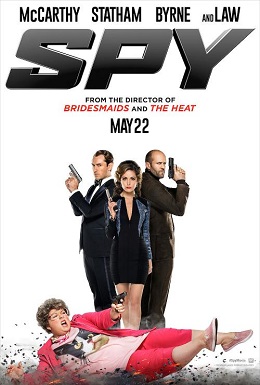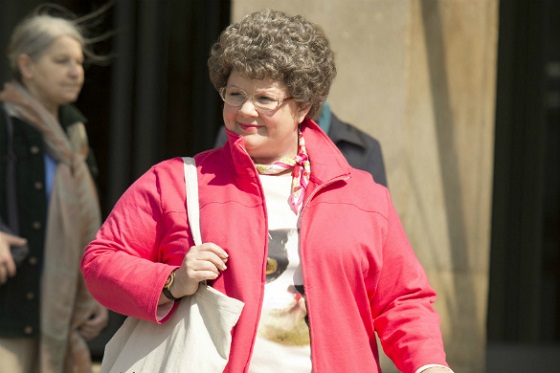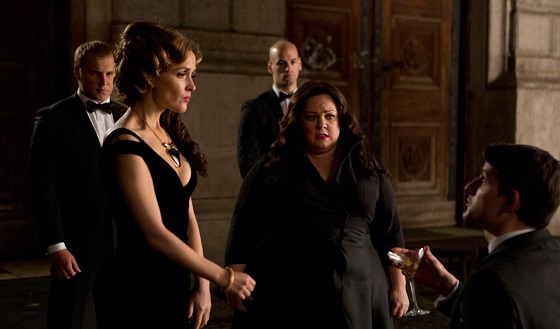Operating on a believability level that puts it in the same universe as recent espionage offerings like Red or The Interview, director Paul Feig’s newest film, Spy, is as funny as it is fun. The movie stars Melissa McCarthy as C.I.A. computer-jockey Susan Cooper, whose primary function at Langley is as an analyst in support of super-spy Bradley Fine (Jude Law).
Traditionally handsome, sophisticated, confident, and capable in all the ways that she isn’t, Agent Fine is the only real connection to the glamorous C.I.A. life Susan dreamed about when she joined the agency a decade ago. Yet after Agent Fine falls victim to an unfortunate turn of events in the line of duty, Cooper volunteers to go out into the field to get some answers and finish the work he started.
Out of shape, squeamish, and without any experience in “the field,” Cooper is not the C.I.A.’s ideal choice for the assignment. Yet this outlandish scenario is the foundation for the picture, so Spy dismisses any questions about Susan’s suitability for the assignment with a convenient side-step involving blown-covers and the tried-and-true “the idea is so crazy the bad guys will never see it coming” logic.
As goofy and far-fetched as this premise may seem, top-notch dialogue, surprisingly sharp acting, and a consistent tone hold Spy together. Indeed, any gaps that might have allowed for second-guessing on a couple plot points are filled with laughter, which comes as a result of a delicate balancing act between shocking violence and wacky antics. James Bond audiences have never been allowed to have this much fun with the genre, for at PG-13, that cannon can’t venture into some of the blue areas that Spy plays around in with its hard R. Some of the best moments of Fieg’s film come when Melissa McCarthy is let off the leash and allowed to run wild through scenes, dropping insults like “Thundercunt” and “you look like a slutty dolphin trainer” with aplomb.
Still, the film doesn’t let the audience forget that Susan Cooper is entirely out of her element in the field, and that she doesn’t fit the mold of the traditional secret agent. One of the most enjoyable facets of Spy is its willingness to lambast and punish its characters, who aren’t 100% infallible or even competent. Although Susan is a naturally good shot and hand-to-hand fighter, there’s a great running gag about the frumpy assumed identities she’s forced to take on, and an even better sub-plot about her woefully outmatched support team. Although fish out of water jokes regarding Susan’s presence on assignment drive the central conceit of this comedy, the execution of the material sets Spy apart from other, cheaper spoof-espionage fare like Austin Powers or even the aforementioned Interview.
Rose Byrne does an especially good job as the picture’s primary villain, the cruel and dangerous Raina Boyanov. Solid supporting efforts are also turned in by Miranda Hart and Peter Serafinowicz, whose characters act as the agents aiding Susan on her mission. Really, though, Spy belongs to Melissa McCarthy, who seems to be (hopefully) moving away from the more formulaic clown-comedy she’s been subjected to since her Bridesmaids breakout (i.e., Tammy, Identity Thief, The Heat). Feig’s writing paired with McCarthy’s total commitment to the material are the fuel and spark of Spy, and push it through some of the more outlandish developments the plot is forced to endure. Again, some of the funniest moments of the film come when Susan Cooper is getting dressed down, or humiliated, yet the character is able to give as good as she gets, which creates a nice balance to the comedy.
That said, this picture probably isn’t for everyone. There’s a certain amount of disbelief suspension required to enjoy Spy, along with a well-developed sense of humor that can see the comedy in graphic, unexpected violence that would fit well in a Tarantino picture. Although some of the gags don’t pay off completely (like most involving Jason Statham’s cartoonish character), the writing elevates the material to a higher plane.
Feig’s ability to breathe fresh air into a somewhat stale concept bodes well for his and Ms. McCarthy’s expected reboot of the Ghostbusters franchise, which might very well succeed if it is as sharp and creative with its writing and comedy set pieces as Spy is.
Currently playing at the Seattle International Film Festival, where it was the featured film for opening night, Spy opens across the country today, and is a damn good time.









Comments on this entry are closed.